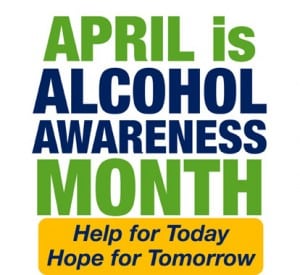Alcohol Awareness Month was established in 1987 by the National Council on Alcoholism and Drug Dependence (NCADD) with the goal of reducing the stigma that is often associated with alcoholism. Its objective is to reach out to the public with information about alcoholism and recovery. The public needs to be made aware that alcoholism is a chronic, progressive disease that is genetically predisposed. There are about 20 million people living in recovery. By drinking too much alcohol, a person increases their risk of injuries, violence, drowning, liver disease, and some forms of cancer. But, the good news is that we can all do our part to prevent alcohol abuse.
Every April, Alcohol Awareness Month provides an awareness of alcoholism, its causes, treatments, and recovery. NCADD, along with their other supporting organizations, addresses the nation’s #1 health problem via media strategies, awareness campaigns, and various events within communities.
According to an NCADD spokesperson, “An integral part of NCADD Alcohol Awareness Month is Alcohol-Free Weekend, which takes place on the first weekend of April to raise public awareness about the use of alcohol and how it may be affecting individuals, families, businesses, and our communities. During Alcohol-Free Weekend, NCADD extends an open invitation to all Americans to engage in three alcohol-free days. Those individuals or families who experience difficulty or discomfort in this 72-hour experiment are urged to contact local NCADD affiliates, Alcoholics Anonymous (AA) and Al-Anon to learn more about alcoholism and its early symptoms.”
Among the seniors in America, alcohol abuse and alcoholism are under-recognized. About one-third of these older people develop a problem with alcohol. Sometimes, the effects of alcohol are increased by some of the pharmacological changes associated with aging. And, sometimes, the interaction between alcohol and prescriptions and over-the-counter medications may be more serious in elderly people.
When physicians are caring for older patients with alcohol problems, they often encounter interrelated medical, behavioral, and social environmental factors. A non-judgmental attitude is imperative when dealing with these situations. The physician needs to have a flexible approach to individualize treatment for the patient with advanced age.
For more information about alcoholism and the elderly, call Kabb Law to speak with our experts at 216-991 5222.

